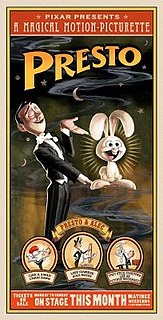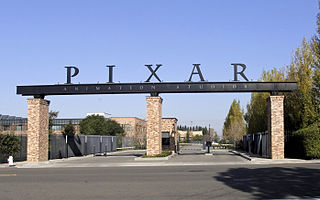
Toy Story is a 1995 American computer-animated adventure comedy film produced by Pixar Animation Studios and released by Walt Disney Pictures. The feature-film directorial debut of John Lasseter, it was the first feature-length film to be entirely computer-animated, as well as the first feature film from Pixar. The screenplay was written by Joss Whedon, Andrew Stanton, Joel Cohen, and Alec Sokolow from a story by Lasseter, Stanton, Pete Docter, and Joe Ranft. The film features music by Randy Newman, and was executive-produced by Steve Jobs and Edwin Catmull. The film features the voices of Tom Hanks, Tim Allen, Don Rickles, Wallace Shawn, John Ratzenberger, Jim Varney, Annie Potts, R. Lee Ermey, John Morris, Laurie Metcalf, and Erik von Detten. Taking place in a world where anthropomorphic toys come to life when humans are not present, its plot focuses on the relationship between an old-fashioned pull-string cowboy doll named Woody and an astronaut action figure, Buzz Lightyear, as they evolve, from rivals competing for the affections of their owner Andy Davis, to friends who work together to be reunited with him after being separated.
Modern animation of the United States from the late 1980s and 1990s onward is sometimes referred to as the "renaissance age of American animation". During this period, many large American entertainment companies reformed and reinvigorated their animation departments following a general decline during the 1960s to 1980s. The United States has had a profound effect on animation worldwide. Since the late 1990s and the 2000s traditional animation would lose interest against digital and Flash animation, naming this current period as the "millennium age of American animation".

Edwin Earl "Ed" Catmull is an American computer scientist and former president of Pixar and Walt Disney Animation Studios. As a computer scientist, Catmull has contributed to many important developments in computer graphics.
Autodesk 3ds Max, formerly 3D Studio and 3D Studio Max, is a professional 3D computer graphics program for making 3D animations, models, games and images. It is developed and produced by Autodesk Media and Entertainment. It has modeling capabilities and a flexible plugin architecture and can be used on the Microsoft Windows platform. It is frequently used by video game developers, many TV commercial studios and architectural visualization studios. It is also used for movie effects and movie pre-visualization. For its modeling and animation tools, the latest version of 3ds Max also features shaders, dynamic simulation, particle systems, radiosity, normal map creation and rendering, global illumination, a customizable user interface, new icons, and its own scripting language.

Luxo Jr. is a 1986 American computer-animated short film produced and released by Pixar in 1986. Written and directed by John Lasseter, this two-minute short film revolves around one larger and one smaller desk lamp. The larger lamp, named Luxo Sr., looks on while the smaller, "younger" Luxo Jr. plays exuberantly with a ball that it accidentally deflates. Luxo Jr. was Pixar's first animation after Ed Catmull and John Lasseter left Industrial Light & Magic's computer division of Cinetron Computer Systems. It is the source of Luxo Jr., the hopping desk lamp included in Pixar's corporate logo.

Geri's Game is a 1997 American computer-animated short film written and directed by Jan Pinkava and produced by Pixar. The short, which follows an old man who competes with himself in a game of chess, was Pixar's first film to feature a human being as its main character. The character in the short later made an appearance in Toy Story 2.

John Alan Lasseter is an American animator, filmmaker, and former chief creative officer of Walt Disney Animation Studios, Pixar and the defunct Disneytoon Studios. He was also the Principal Creative Advisor for Walt Disney Imagineering.

Walt Disney Animation Studios (WDAS), also referred to as Disney Animation, headquartered at the Walt Disney Studios in Burbank, California, is an American animation studio that creates animated feature films, short films and television specials for The Walt Disney Company. Founded on October 16, 1923, it is a division of Walt Disney Studios. The studio has produced 57 feature films, from Snow White and the Seven Dwarfs (1937) to Ralph Breaks the Internet (2018).
Pixar RenderMan is proprietary photorealistic 3D rendering software produced by Pixar Animation Studios. Pixar uses RenderMan to render their in-house 3D animated movie productions and it is also available as a commercial product licensed to third parties.
The Computer Animation Production System (CAPS) was a digital ink and paint system used in animated feature films, the first at a major studio, designed to replace the expensive process of transferring animated drawings to cels using India ink or xerographic technology, and painting the reverse sides of the cels with gouache paint. Using CAPS, enclosed areas and lines could be easily colored in the digital computer environment using an unlimited palette. Transparent shading, blended colors, and other sophisticated techniques could be extensively used that were not previously available.
An animation studio is a company producing animated media. The broadest such companies conceive of products to produce, own the physical equipment for production, employ operators for that equipment, and hold a major stake in the sales or rentals of the media produced. They also own rights over merchandising and creative rights for characters created/held by the company, much like authors holding copyrights. In some early cases, they also held patent rights over methods of animation used in certain studios that were used for boosting productivity. Overall, they are business concerns and can function as such in legal terms.
A Marionette is a type of puppet moved by strings. Marionette may also refer to:

Moho is a proprietary vector-based 2D animation software distributed by Smith Micro Software. Moho,, was originally distributed by LostMarble, and then by e frontier. Smith Micro Software changed the name to Anime Studio and distributed the software since November 2007. The software comes in two different versions, Moho Debut and Moho Pro. The first being restricted in terms of length and image size, as well as not containing all of the functions of the Pro version. Moho is available for Windows and macOS in English, German, Japanese and Spanish. Moho Pro no longer supports the Linux platform.
Eben Fiske Ostby is a pioneer computer graphics software developer, animator, and technical director for motion pictures. He was one of the four first employees of Pixar, where he worked with John Lasseter on early breakthrough Pixar animation shorts such as Luxo Jr., Red's Dream, Tin Toy, Knick Knack, and For the Birds.

Ratatouille is a 2007 American computer-animated comedy film produced by Pixar and released by Walt Disney Pictures. It is the eighth film produced by Pixar and was co-written and directed by Brad Bird, who took over from Jan Pinkava in 2005. The title refers to a French dish, "Ratatouille", which is served at the end of the film and is also a play on words about the species of the main character. The film stars the voices of Patton Oswalt as Remy, an anthropomorphic rat who is interested in cooking; Lou Romano as Linguini, a young garbage boy who befriends Remy; Ian Holm as Skinner, the head chef of Auguste Gusteau's restaurant; Janeane Garofalo as Colette, a rôtisseur at Gusteau's restaurant; Peter O'Toole as Anton Ego, a restaurant critic; Brian Dennehy as Django, Remy's father and leader of his clan; Peter Sohn as Emile, Remy's older brother; and Brad Garrett as Auguste Gusteau, a recently deceased chef. The plot follows a rat named Remy, who dreams of becoming a chef and tries to achieve his goal by forming an alliance with a Parisian restaurant's garbage boy.

Presto is a 2008 American Pixar computer animated short film shown in theaters before their feature-length film WALL-E. The short is about a magician trying to perform a show with his uncooperative rabbit and is a gag-filled homage to classic cartoons such as Tom and Jerry and Looney Tunes, as well as the work of Tex Avery. Presto was directed by veteran Pixar animator Doug Sweetland, in his directorial debut.

Modo is a polygon and subdivision surface modeling, sculpting, 3D painting, animation and rendering package developed by Luxology, LLC, which is now merged with and known as Foundry. The program incorporates features such as n-gons and edge weighting, and runs on Microsoft Windows, Linux and macOS platforms.













